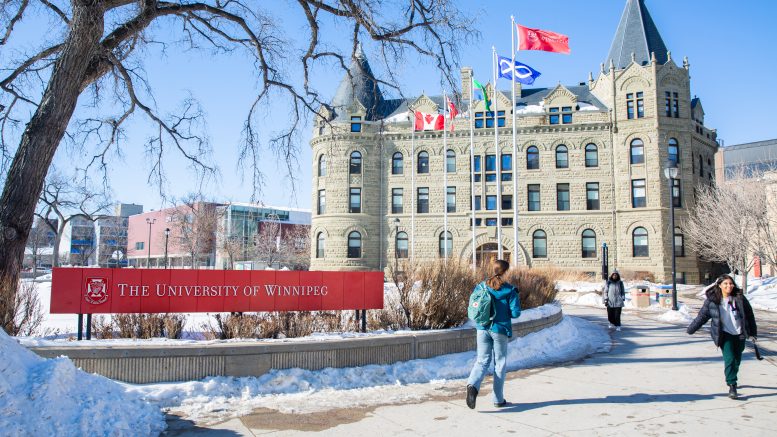A University of Winnipeg professor’s talk on the economic interests involved in gender affirming health care caused controversy last week, leading to protests and calls to cancel the event.
U of W political science professor Joanne Boucher’s lecture, titled “The Commodification of the Human Body: The Case of Transgender Identities,” was advertised as part of the U of W department of political science’s 2022-23 speaker series.
A poster for the event said that the talk would “focus on the economic interests involved in transgenderism” and would examine the role of governments, corporate lobby groups and the medical and biotechnology industries.
The talk caused controversy among U of W students and non-students alike, and received coverage from a number of outlets in the lead-up to the event. Boucher declined requests for comment from press.
University of Winnipeg Students’ Association 2SLGBTQ* students’ director Brie Villeneuve said that they were concerned when they saw the event description, particularly its use of terms such as “the commodification of the human body.”
“That’s kind of saying that we’re some capitalistic or pharmaceutical ploy or something, which is just a really gross way of [thinking],” they said.
They also pointed out that the term “transgenderism,” which was used in the event description, is a term not typically used by the trans community and is often utilized by anti- trans groups or individuals to delegitimize trans identity by depicting it as merely an
ideological perspective.
While Villeneuve said that dialogue and academic freedom are important, they argued that hate speech should not be protected.
A Change.org petition to cancel the event gathered over 1,700 signatures.
Aaron Moore, chair of the political science department, declined to speak to the Manitoban. Boucher did not respond to multiple requests for comment.
The university released a statement saying they would not be “intervening” in the talk. U of W assistant English professor Alyson Brickey noted that the university making clear that it would not intervene is strange, since the administration allowed the talk to go forward in the first place.
“They’ve already performed an action that is supportive of this event, whether implicitly or explicitly,” she said. “I think in some ways, it’s something that they could have stopped earlier, or at least raised some concern about a lot earlier.”
“They failed to do so, and now they are refusing to intervene in what essentially was within their control to change.”
Brickey said that she supports academic freedom, but that it should not be used as a cover to promote intolerance. She pointed out that hate speech is not legally protected in Canada.
However, she said that she doesn’t “think the law has anything to do with this.”
“We have members of our community that are telling us that they are feeling unsafe and that they are feeling unwelcomed by an institution that claims to welcome them, and we ought to listen to those voices,” she explained.
Brickey and two English professors from the U of M organized a “Trans Love Cupcake Hour,” an open roundtable event scheduled at the same time as Boucher’s lecture intended “to hold a space of community connection and really celebrate our wonderful 2SLGBTQIA community at the University of Winnipeg and in the broader city as well.”
Confusion following lecture’s last-minute switch to Zoom
Those seeking to attend the talk were left scrambling when they arrived at the scheduled location and found a sign on the door notifying attendees that the lecture had been moved online to Zoom.
A representative from the university led a group of people waiting outside the lecture hall to the university library to view the online lecture.
The sign on the lecture hall door contained a URL for the Zoom meeting, but when the group arrived at the library, they learned that the meeting required a password to enter, which had not been provided.
The group was then led back to the lecture hall so that the Zoom meeting could be shown on the projector. By this time, the group had missed about 20 minutes of the lecture.
Boucher’s talk discussed the profit-seeking interests involved in trans health care and argued that these interested groups see increases in people seeking treatments as an expansion of potential markets.
She explored how economic and legal barriers to trans health care vary depending on what medical and legal systems one may live under. Boucher said that the costs of some treatments and surgeries may be prohibitive for some. She continued that it was not her intent to make recommendations on legal policy concerning gender affirming health care.
Boucher also said that investors in gender-affirming health care see legal and political environments that accept and affirm trans and gender non-conforming people as “crucial to market expansion.”
She discussed the potential negative side-effects associated with some treatments and argued that pharmaceutical companies may not be inclined to closely study the effects of already profitable drugs used in gender affirming health care.
Protestors hold rally on front lawn
As Boucher spoke, a crowd gathered on the U of W campus front lawn to protest the event.
A number of people gave speeches denouncing the talk, including Manitoba NDP MLA Uzoma Asagwara.
Asagwara told the crowd that as a non-binary person themself, “these moments are tough.”
They said that trans and non-binary people “are not obligated to educate people” or to “respond to the demands of people to justify our existence.”
“We do that work and we do it really, really well, but do that heavy lifting on your own,” they said.
“Get on Google, go to the library, go on social media and follow and support trans and non-binary people who have the capacity to do that work.”
Brook Allarie, a first-year psychology student at the U of W, said that they are angry the university allowed the talk to go forward.
Regarding the outcome of the protest, Allarie said that they “want the university to see that things like this are not okay.”
“In our modern world, we have trans students, gender diverse students — I’m one of them,” they said.
Allarie said that they feel discussions of trans issues should include trans voices.
“Why are you, as a cisgender person, trying to spread this rhetoric about transgender people without consulting transgender people, without having them be involved in the message that you’re spreading?” they said.





